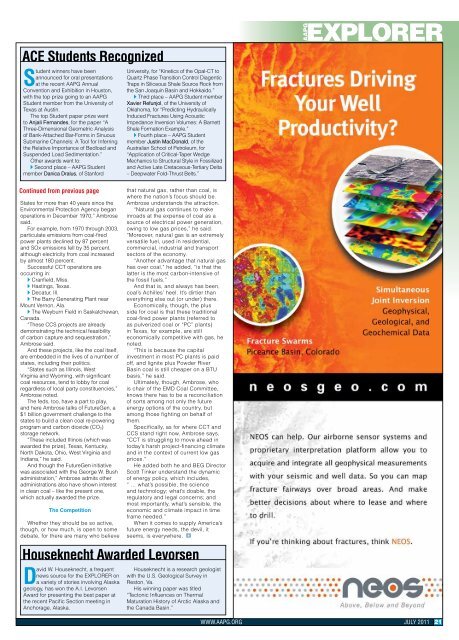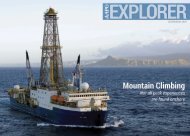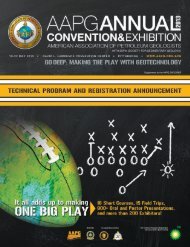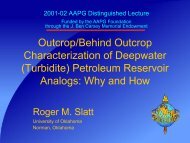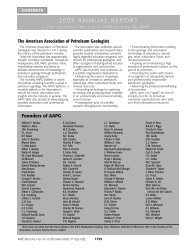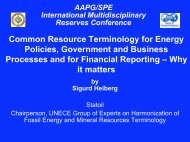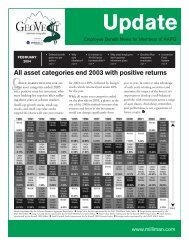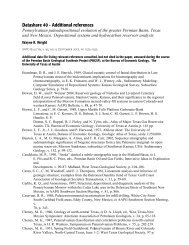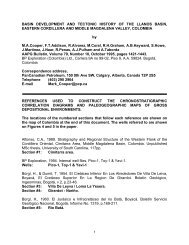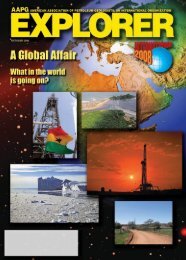AAPG Explorer - American Association of Petroleum Geologists
AAPG Explorer - American Association of Petroleum Geologists
AAPG Explorer - American Association of Petroleum Geologists
Create successful ePaper yourself
Turn your PDF publications into a flip-book with our unique Google optimized e-Paper software.
ACE Students Recognized<br />
Student winners have been<br />
announced for oral presentations<br />
at the recent <strong>AAPG</strong> Annual<br />
Convention and Exhibition in Houston,<br />
with the top prize going to an <strong>AAPG</strong><br />
Student member from the University <strong>of</strong><br />
Texas at Austin.<br />
The top Student paper prize went<br />
to Anjali Fernandes, for the paper “A<br />
Three-Dimensional Geometric Analysis<br />
<strong>of</strong> Bank-Attached Bar-Forms in Sinuous<br />
Submarine Channels: A Tool for Inferring<br />
the Relative Importance <strong>of</strong> Bedload and<br />
Suspended Load Sedimentation.”<br />
Other awards went to:<br />
u Second place – <strong>AAPG</strong> Student<br />
member Danica Dralus, <strong>of</strong> Stanford<br />
Continued from previous page<br />
States for more than 40 years since the<br />
Environmental Protection Agency began<br />
operations in December 1970,” Ambrose<br />
said.<br />
For example, from 1970 through 2003,<br />
particulate emissions from coal-fired<br />
power plants declined by 87 percent<br />
and SOx emissions fell by 35 percent,<br />
although electricity from coal increased<br />
by almost 180 percent.<br />
Successful CCT operations are<br />
occurring in:<br />
u Cranfield, Miss.<br />
u Hastings, Texas.<br />
u Decatur, Ill.<br />
u The Barry Generating Plant near<br />
Mount Vernon, Ala.<br />
u The Weyburn Field in Saskatchewan,<br />
Canada.<br />
“These CCS projects are already<br />
demonstrating the technical feasibility<br />
<strong>of</strong> carbon capture and sequestration,”<br />
Ambrose said.<br />
And these projects, like the coal itself,<br />
are embedded in the lives <strong>of</strong> a number <strong>of</strong><br />
states, including their politics.<br />
“States such as Illinois, West<br />
Virginia and Wyoming, with significant<br />
coal resources, tend to lobby for coal<br />
regardless <strong>of</strong> local party constituencies,”<br />
Ambrose noted.<br />
The feds, too, have a part to play,<br />
and here Ambrose talks <strong>of</strong> FutureGen, a<br />
$1 billion government challenge to the<br />
states to build a clean coal re-powering<br />
program and carbon dioxide (CO2)<br />
storage network.<br />
“These included Illinois (which was<br />
awarded the prize), Texas, Kentucky,<br />
North Dakota, Ohio, West Virginia and<br />
Indiana,” he said.<br />
And though the FutureGen initiative<br />
was associated with the George W. Bush<br />
administration,” Ambrose admits other<br />
administrations also have shown interest<br />
in clean coal – like the present one,<br />
which actually awarded the prize.<br />
The Competition<br />
Whether they should be so active,<br />
though, or how much, is open to some<br />
debate, for there are many who believe<br />
University, for “Kinetics <strong>of</strong> the Opal-CT to<br />
Quartz Phase Transition Control Diagentic<br />
Traps in Siliceous Shale Source Rock from<br />
the San Joaquin Basin and Hokkaido.”<br />
u Third place – <strong>AAPG</strong> Student member<br />
Xavier Refunjol, <strong>of</strong> the University <strong>of</strong><br />
Oklahoma, for “Predicting Hydraulically<br />
Induced Fractures Using Acoustic<br />
Impedance Inversion Volumes: A Barnett<br />
Shale Formation Example.”<br />
u Fourth place – <strong>AAPG</strong> Student<br />
member Justin MacDonald, <strong>of</strong> the<br />
Australian School <strong>of</strong> <strong>Petroleum</strong>, for<br />
“Application <strong>of</strong> Critical-Taper Wedge<br />
Mechanics to Structural Style in Fossilized<br />
and Active Late Cretaceous-Tertiary Delta<br />
– Deepwater Fold-Thrust Belts.”<br />
that natural gas, rather than coal, is<br />
where the nation’s focus should be.<br />
Ambrose understands the attraction.<br />
“Natural gas continues to make<br />
inroads at the expense <strong>of</strong> coal as a<br />
source <strong>of</strong> electrical power generation,<br />
owing to low gas prices,” he said.<br />
“Moreover, natural gas is an extremely<br />
versatile fuel, used in residential,<br />
commercial, industrial and transport<br />
sectors <strong>of</strong> the economy.<br />
“Another advantage that natural gas<br />
has over coal,” he added, “is that the<br />
latter is the most carbon-intensive <strong>of</strong><br />
the fossil fuels.”<br />
And that is, and always has been,<br />
coal’s Achilles’ heel. It’s dirtier than<br />
everything else out (or under) there.<br />
Economically, though, the plus<br />
side for coal is that these traditional<br />
coal-fired power plants (referred to<br />
as pulverized coal or “PC” plants)<br />
in Texas, for example, are still<br />
economically competitive with gas, he<br />
noted.<br />
“This is because the capital<br />
investment in most PC plants is paid<br />
<strong>of</strong>f, and lignite plus Powder River<br />
Basin coal is still cheaper on a BTU<br />
basis,” he said.<br />
Ultimately, though, Ambrose, who<br />
is chair <strong>of</strong> the EMD Coal Committee,<br />
knows there has to be a reconciliation<br />
<strong>of</strong> sorts among not only the future<br />
energy options <strong>of</strong> the country, but<br />
among those fighting on behalf <strong>of</strong><br />
them.<br />
Specifically, as for where CCT and<br />
CCS stand right now, Ambrose says,<br />
“CCT is struggling to move ahead in<br />
today’s harsh project-financing climate<br />
and in the context <strong>of</strong> current low gas<br />
prices.”<br />
He added both he and BEG Director<br />
Scott Tinker understand the dynamic<br />
<strong>of</strong> energy policy, which includes,<br />
“ … what’s possible, the science<br />
and technology; what’s doable, the<br />
regulatory and legal concerns; and<br />
most importantly, what’s sensible, the<br />
economic and climate impact in time<br />
frame needed.”<br />
When it comes to supply America’s<br />
future energy needs, the devil, it<br />
seems, is everywhere. EXPLORER<br />
Houseknecht Awarded Levorsen<br />
David W. Houseknecht, a frequent<br />
news source for the EXPLORER on<br />
a variety <strong>of</strong> stories involving Alaska<br />
geology, has won the A.I. Levorsen<br />
Award for presenting the best paper at<br />
the recent Pacific Section meeting in<br />
Anchorage, Alaska.<br />
Houseknecht is a research geologist<br />
with the U.S. Geological Survey in<br />
Reston, Va.<br />
His winning paper was titled<br />
“Tectonic Influences on Thermal<br />
Maturation History <strong>of</strong> Arctic Alaska and<br />
the Canada Basin.”<br />
<strong>AAPG</strong><br />
EXPLORER<br />
WWW.<strong>AAPG</strong>.ORG JULY 2011<br />
21


